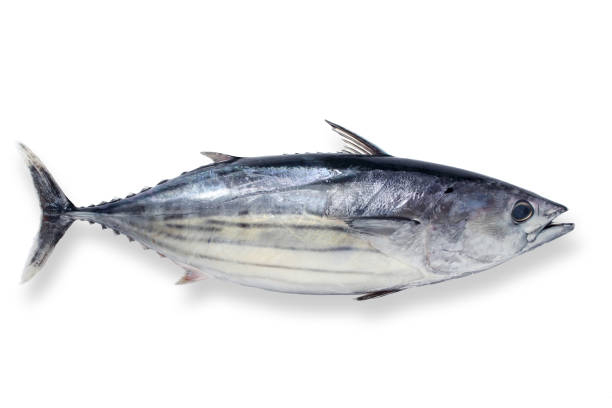Top 8 Health Benefits of Eating Tuna
If you enjoy sushi, you will appreciate the particular flavor of tuna and why it is so sought after. Tuna is a prominent saltwater fish found in Asian cuisines ... read more...as well as on other continents such as Australia and Europe. Tuna fish of many varieties are found all throughout the world's oceans, including blue fin, yellow fin, and bullet tuna, to mention a few. Let's look at the health benefits of eating tuna.
-
Tuna is one of the top sources of vitamin D in the diet. Just 3 ounces of canned tuna can provide up to 50% of the required daily amount. Vitamin D is essential for bone health, immune system strength, and promoting normal growth in youngsters.
Tuna is also a great source of other vitamins and minerals, such as:
- Iron
- Vitamin B6
- Potassium
- Selenium
- Iodine
A 4-ounce serving of white tuna contains:
- Calories: 145
- Protein: 26.77 grams
- Fat: 3.37 grams
- Carbohydrates: 0 grams
- Fiber: 0 grams
- Sugar: 0 grams
You can find tuna fresh or canned at grocery stores across the country. Since canned tuna contains less mercury than fresh tuna, it may be a better option for some. Canned tuna is always cooked beforehand and can be eaten directly upon opening.

High in Nutrients 
High in Nutrients -
The most prevalent health benefit associated with tuna fish is its strong influence on heart health. This fish may have high amounts of omega-3 fatty acids, which may help lower omega-6 fatty acids and LDL or bad cholesterol in the arteries and blood vessels, which may help minimize coronary heart disease. Furthermore, it frequently replaces meals high in saturated fat, decreasing the risk of heart disease even further. Women who consume more fish, notably tuna, and omega-3 fatty acids had a decreased risk of coronary heart disease, according to research published in the Journal of the American Medical Association.
Anti-inflammatory omega-3 fatty acids may help lower blood pressure. Potassium, which is contained in tuna, is a potential vasodilator and may be beneficial in decreasing blood pressure. Lowering your blood pressure can considerably improve your health by reducing the load on your cardiovascular system. This may aid in the prevention of heart attacks and strokes, as well as disorders such as atherosclerosis.

May Improve Heart Health and Improve Blood Pressure 
May Improve Heart Health and Improve Blood Pressure -
Tuna fish, which may be high in omega-3 fatty acids, may be an excellent choice for avoiding eye problems such as age-related macular degeneration. The National Eye Institute's (NEI) director, Paul A. Sieving, M.D., Ph.D., and John Paul SanGiovanni, Sc.D., were involved in a thorough research investigation on the role of dietary omega-3 fatty acids in the genesis and progression of retinal disease. This illness is the leading cause of blindness in the older population. Diabetic problems can potentially cause blindness, and this fish can help reduce the risk of diabetic retinopathy.
The protein content of tuna fish is substantial. A single serving of tuna fish (about 1 can) delivers more than 80% of your daily protein intake. Proteins are the building blocks of your body, ensuring development, quicker healing from wounds and diseases, better muscular tone, and general metabolic efficiency.

May Aid in Eye Care and Improve Growth and Development 
May Aid in Eye Care and Improve Growth and Development -
Tuna fish is low in calories and fat, but high in important elements such as protein. This fish's omega-3 fatty acids may increase leptin, a hormone that balances the body's food intake with the internal desire to consume more. This can help to minimize overeating and ensure that your body is just absorbing what it requires. According to a study published in the European Journal of Clinical Nutrition, omega-3 fatty acids are linked to leptin elevations in obese persons. Increased leptin levels may assist these people to avoid regaining weight after losing weight through calorie restriction.
Tuna has potentially beneficial amounts of vitamin C, zinc, and manganese, all of which are antioxidants in nature. Antioxidants are one of the body's defensive systems against free radicals, which are damaging byproducts of cellular metabolism and are linked to chronic illnesses. However, selenium is the true champion of tuna's immune-boosting ability. This fish is high in this mineral, providing about 200 percent of the daily value in a single meal. As a result, the fish is a potent antioxidant and immune-boosting meal.

May Aid in Weight Loss and Boost The Immune System 
May Aid in Weight Loss and Boost The Immune System -
The B complex vitamins found in tuna have been linked to a variety of health benefits. They play a direct role in energy metabolism, improving organ efficiency, protecting the skin, and raising energy levels. B vitamins work as cofactors for enzymes, speeding up metabolic events and allowing them to create energy at the pace required. You may stay active, energetic, and healthy by eating this fish on a daily basis.
Tuna is high in iron and B-complex vitamins, both of which are essential for red blood cell development. People become anemic when they lack iron, and their blood is unable to sufficiently oxygenate the important organs that require fresh oxygen to operate properly.

Boost Energy Levels and Improve Blood Circulation 
Boost Energy Levels and Improve Blood Circulation -
Because of the antioxidant qualities of selenium and other minerals, tuna fish may be useful in avoiding some forms of cancer. Research published in the American Association for Cancer Research titled "A 22-year Prospective Study of Fish, n-3 Fatty Acid Intake, and Colon Cancer Risk in Men" revealed that eating fish, particularly fatty fish, may reduce the risk of colorectal cancer.
Tuna has a well-balanced potassium and sodium content, which means it is probably rich in potassium and low in sodium. This aids in maintaining the body's fluid equilibrium. When your body maintains a fluid balance, your kidneys operate normally, minimizing your risk of developing significant kidney disorders. However, if you have a chronic renal illness, consult your doctor or a nutritionist before adding tuna or making other substantial dietary changes. Tuna contains potassium and phosphorus, both of which can accumulate and become poisonous in those with damaged kidneys.

Potentially Anti-cancer Properties and Provide Relief in Kidney Diseases 
Potentially Anti-cancer Properties and Provide Relief in Kidney Diseases -
Because of the possibly anti-inflammatory vitamins and minerals, tuna fish can lower overall stress levels in the body by lowering inflammation. A decrease in inflammation throughout the body ensures that all organs work properly. It also aids in the prevention of inflammatory disorders like arthritis and gout, which affect millions of people worldwide.
When tuna fish is cooked, the proteins begin to degrade into bits known as peptides. These fragments have the potential to be potent antioxidants that selectively target cell membranes, keeping them healthy, robust, and functional. Because free radicals frequently assault membranes throughout the body, including those in the brain, eating cooked tuna and boosting membrane defense is a great idea!

Help with Reduced Inflammation and Reduce Cell Membrane Damage 
Help with Reduced Inflammation and Reduce Cell Membrane Damage -
Consuming fish, or any fish, over a specific limit can raise the mercury level in your body to a hazardous level. According to research, there is a distinct type of selenium known as selenoneine. This binds to mercury and serves as an antioxidant, modifying the composition of mercury somewhat to make it less hazardous. However, investigations are still being conducted to fully confirm this. Despite its mercury concentration, frequent intake of fish is suggested due to its health advantages. Avoid long-lived species that tend to accumulate more mercury, such as king mackerel, swordfish, and tilefish, to reduce mercury exposure.
Tuna fish consumption is beneficial for depression relief due to its high omega-3 fatty acid content. According to the conclusions of a study, women's mental health may benefit from eating fish. It can also help ladies who are depressed. According to a meta-analysis published in The Journal of Clinical Psychiatry, there is substantial evidence that omega-3 fatty acids may help with bipolar depressive symptoms.

Aid in Relieving Depression and Selenium Balance 
Aid in Relieving Depression and Selenium Balance





























